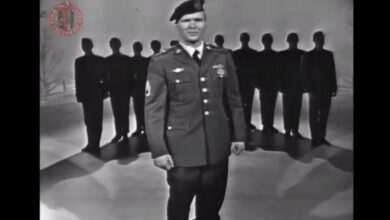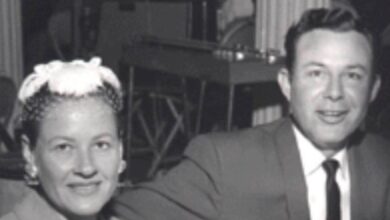Priscilla Says Elvis Poured All His Emotions Into This Song
Elvis Presley’s story resonates with the spirit of innovation and resilience that characterizes many great artists. Born on January 8, 1935, in Tupelo, Mississippi, Elvis was the only surviving child of Vernon and Gladys Presley. The family faced financial hardships, and the struggles of the Great Depression shaped their lives. When Elvis was just a teenager, the family moved to Memphis, Tennessee, which would become the cultural epicenter of his musical journey. Memphis, teeming with various musical influences, allowed Elvis to grow up listening to diverse genres. This exposure instilled in him a respect for different musical traditions, greatly influencing his artistic development.
Elvis’s initial foray into music began when he received a guitar as a gift on his 11th birthday. He practiced diligently, demonstrating a natural talent that would soon emerge. Despite being shy by nature, he found solace and purpose in music, which became a means for him to express himself. His love for music was ignited by the sounds of Mississippi and later the vibrant atmosphere of Memphis, where he would often attend church with his family. The gospel music he encountered in church settings became one of his most significant influences, leading to a deep appreciation for soulful melodies and rich harmonies.
In 1954, armed with a unique vocal style that combined rhythm and blues with country, Elvis recorded “That’s All Right” at Sun Studio. The response was immediate and visceral; this marked the dawn of rock and roll as a major force in American music. He became a symbol of youthful rebellion, attracting attention not just for his music but also for his flamboyant performance style that included his infamous dance moves. The combination of his looks, talent, and stage presence propelled him into superstardom, and soon after, iconic songs like “Blue Suede Shoes” and “Love Me Tender” dominated the charts.
As the 1950s progressed, Elvis became synonymous with rock and roll. His recordings broke sales records and his dynamic performances revolutionized the music industry. However, his rapid ascendance was not without controversy. Many critics and conservative figures condemned his style and performances, which they considered inappropriate. Nevertheless, these challenges only seemed to bolster his appeal, particularly among the younger generation, captivated by his charisma and the liberating message his music conveyed.
In addition to his booming music career, Elvis also ventured into acting, marking his presence in Hollywood with a series of films where he generally played the lead role. Titles like “Jailhouse Rock” and “Viva Las Vegas” became incredibly popular, though many critics argued that the quality of his musical output suffered in favor of commercial viability. By the mid-1960s, while he remained a household name, the innovativeness of his music seemed to take a backseat to his film career. This era proved complex for Elvis; although he was still commercially successful, there was a marked decline in his contributions to music.
The transformative “68 Comeback Special” reinvigorated Elvis’ career and reestablished him as a musical force. This televised performance was a spectacular showcase of his talent, unearthing the passion and energy that had originally propelled him to fame. With a blend of revival performances of his classic hits and new songs, Elvis once again captured the hearts of audiences, utilizing the platform to express his emotions and highlight the social issues of the time. His rendition of “If I Can Dream” resonated with viewers on a profound level, embodying the collective aspirations for a better America amidst social unrest.
Elvis’s return to music was marked by an emotional depth that reflected the tumultuous socio-political landscape of the late 1960s. “If I Can Dream” was not merely a song but a powerful message, addressing themes of hope, unity, and the yearning for change during a period rife with challenges. The song conveyed a desire for societal healing, and his passionate performance served as an anthem for those seeking progress, transcending the boundaries of entertainment into a cry for social justice.
Following the comeback special, Elvis continued to perform with renewed vigor. His energetic stage presence during live performances in Las Vegas and on tours was a testament to his love for music and his audience. Moreover, his ability to channel greater emotional depth into his performances further solidified his legacy as one of rock and roll’s greatest stars. The artistry displayed during this period continues to inspire countless musicians and performers, and his influence remains deeply woven into the fabric of modern music.
Even after Elvis’s untimely death in 1977, his legacy only grew stronger. Graceland became a shrine for fans, where they could immerse themselves in the life and times of the King of Rock and Roll. His records have remained timeless, finding new audiences through reinterpretations by contemporary artists across genres. The genres he helped popularize have since evolved, but the essence of his innovation remains foundational. Numerous documentaries and films have revisited his life, further enhancing his status as a cultural icon and innovator.
Ultimately, Elvis Presley transcended the mere definition of a pop star. He was a cultural touchstone who broke down barriers and created new possibilities within the music industry. His story is one of perseverance, artistry, and an enduring legacy that echoes through the generations. Today, he is remembered not just for his music, but for his pioneering spirit that paved the way for future artists to explore the breadth of musical expression, ensuring that the spirit of rock and roll remains vibrant and alive.





